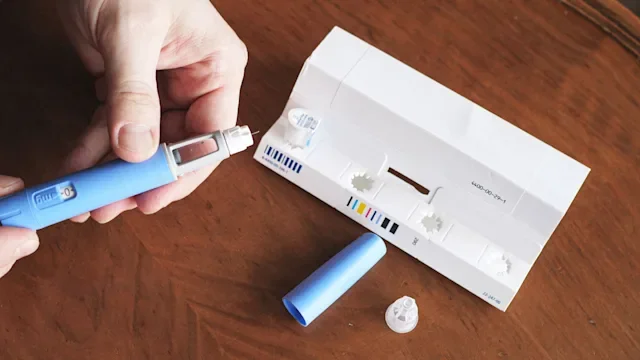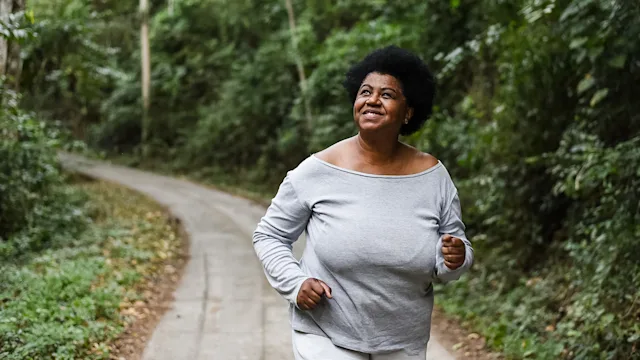Key takeaways:
Cretia Hawkins started taking a glucagon-like peptide-1 (GLP-1) agonist to help her lose weight.
After just the first dose, the constant “food noise” in her head disappeared.
As her dosage increased, she noticed her cravings for alcohol faded, too.
For Cretia Hawkins, a 48-year-old social worker from Greenville, South Carolina, glucagon-like peptide-1 (GLP-1) agonists have done more than help her lose weight. The medications have reshaped her relationship with food, eased her anxiety, and even curbed her cravings for alcohol.
“I love the way I feed on my meds,” Cretia says. “It’s so much more important to me than wine or whatever.”

Cretia began taking Mounjaro (tirzepatide) in early 2023, after her primary care doctor prescribed her the medication to help her lose weight.
Search and compare options
Mounjaro is an injectable medication approved for Type 2 diabetes but often prescribed off-label for weight loss. Later, when her insurance changed in early 2024, she switched to Zepbound, a similar GLP-1 approved specifically for weight loss.
Silencing the ‘food noise’
Like many other people taking GLP-1s, Cretia was intrigued by the buzz surrounding the medications on social media. What she didn’t anticipate was how the medications would quiet the constant “food noise” in her head — and eventually, help her ditch her nightly glass of wine.
After she started taking Monjouro, she stopped obsessing over McDonald’s and Taco Bell. She began to lose weight steadily. And as of the end of 2024, she is down to 183 lbs, with just 20 more to lose before reaching her goal.
But the amount of weight she lost wasn’t the only surprise. As her dosage of Mounjaro increased, Cretia noticed her cravings for alcohol were fading, too.
Is a reduced craving for alcohol a real side effect?
Cretia’s experience mirrors what researchers are learning about GLP-1s.
Over the last 2 years, prescriptions for GLP-1s to treat diabetes and weight loss have skyrocketed, despite the medications’ high price tags. GLP-1s work by increasing insulin release and reducing appetite. People who take them are seeing big reductions in weight, better-regulated blood sugar, and improved overall health.
Beyond those gains, doctors and scientists have also noticed a handful of unexpected and striking side effects. Namely, the medications appear to reduce people's cravings for alcohol, nicotine, and even opioids.
Growing research suggests that, in addition to regulating blood sugar and appetite, GLP-1s also affect the brain’s reward centers. Some studies have even shown they have potential for treating alcohol use disorder.
A lifetime of weigh-ins
Cretia’s challenges with her weight began in childhood. “I always say that I was probably born overweight when I came out of my mom’s womb,” she says.
Getting rid of “food noise”: Read one woman’s account of how a weight-loss medication has freed her from constant hunger.
What does it feel like to take Mounjaro? People who take Mounjaro say it can have side effects, like nausea, but it lowers appetite and helps with weight loss.
How does Mounjaro affect eating habits? Here’s how the diabetes medication helped one woman reduce food cravings and alter her eating habits.
“My grandmother did not mean anything by this, but weight was always an issue,” she adds, explaining that her grandmother’s comments to her as a child led to her issues with weight and “self-talk” in adulthood. “It was almost, like, ‘You’ll get a Hello Kitty watch if you lose 5 lbs’ or ‘No more bread for her.’”
Cretia says she has tried every diet plan, including WW (formerly known as Weight Watchers), Jenny Craig, and keto. To this day, she remembers the first diet she went on. Her grandmother, whom she called Nanny, took her to Weight Watchers when she was in fifth grade. She remembers going to meetings and doing weekly weigh-ins with Nanny starting at 10 years old. And the only times she could have Burger King or McDonald’s were on her cheat days.
Diet culture was ingrained in Cretia early. Even as a child, she’d ask herself questions like “How many calories am I having today?” and “Is today a cheat day?” and “Can I eat what I want?” And throughout her life, food dictated her emotions. If she had a bad day, she ate. If she had a good day, she ate. Every single thing revolved around food.
In high school, Cretia starved herself and worked out constantly to get to a lower weight, because she wanted to fit in. (“Let’s be honest, you get more attention in a smaller body,” she says.) But she put weight on in college and even more after having two kids. She kept up with diets and would lose 30 lbs and then gain 40. At her highest weight, she was 278 lbs.
In 2014, Cretia chose to have gastric sleeve surgery but experienced complications, including a bowel resection and life-threatening sepsis. Even after all that, she says, “I could never get below 208 lbs. That was it. And I was like, ‘OK, I’m gonna accept this.’”
By late 2022, her weight had crept back up to 242 lbs. That’s when she decided to ask her doctor about GLP-1s.
From wine lover to loving her freedom
Before starting treatment with GLP-1s, Cretia drank wine almost daily.
She loved her wine, she says. Specifically, she loved a good pinot grigio or sauvignon blanc. She loved going to wineries with friends. And she regularly went to Costco and Total Wine to stock up for home.
She liked the little buzz she felt while sitting on her back porch with a glass at the end of the workday. But one glass would turn into two, and that would sometimes turn into finishing the whole bottle. And she remembers often thinking, “I can’t wait to get home and have a glass of time” or “Let’s go have a few drinks and get buzzed.”
Before taking GLP-1s, when she had her nightly wine, she was simply doing what made her body feel good. But as she increased her dosage, she felt a noticeable lack of desire for alcohol.
When she would bring a glass of wine to her lips, the taste was the same, but she just didn’t want it. It didn’t feel like a hand slap — like she couldn’t have it or was missing out. She just had no desire. Now, Cretia has a beautiful wine fridge that stays full. But after two sips, she’s finished.
“I was never an alcoholic. But when I say it takes [the desire] away, it’s not just with food. It’s with a lot of things,” she says. “In our community, there are people who had issues with gambling, and they’re on this medication, and they no longer gamble.”
Cretia was struck by her lack of desire to drink recently when she went on vacation. She had two espresso martinis and a couple of glasses of wine the whole trip. And she never once got a buzz.
“We went on cruise, and we got the drink package,” she says. “We wasted our money.”
Life after trying GLP-1 agonists
For Cretia, the weight loss has been great, but her life has changed in more significant ways since she started taking GLP-1s. The medications have given her freedom. And it’s as if she’s a different version of herself, she says.
These days, she reflects back on that 10-year-old who went to Weight Watchers with her Nanny and the young woman whose life revolved around weight. She wishes she could tell them both to love themselves — no matter what they weighed. She would encourage them to understand that they deserve good things no matter their size.
Right now, Cretia says, she’s the most whole she’s ever felt. She expects to be on a GLP-1 for the rest of her life, because she wants to keep it that way.
“I joked that, if I wasn’t 48, I would have twins and name them Eli and Lilly because they created this drug,” she says, referring to the pharmaceutical company that makes both Mounjaro and Zepbound. “But I meant it.”
Trying a GLP-1 really has changed her life, she says.

Why trust our experts?




















